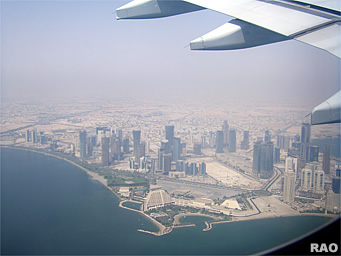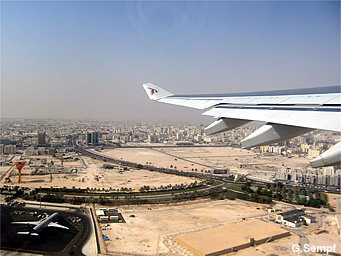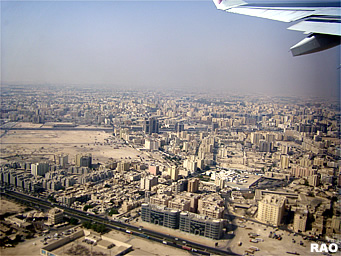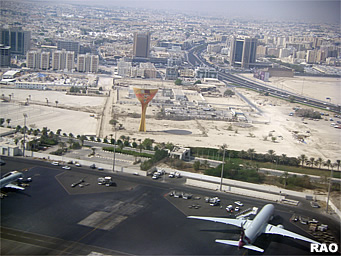|
 |
Qatar |
|
|
|
| The
Sheik of Qatar |
 |
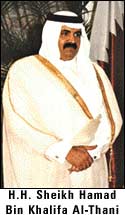 |
The
rest of the population is scattered among a number of towns and villages
including Dukhan, Mesaieed, Al-Wakrah, Al-Khor, Madinat Al-Shamal and other
modern residential centres. Islam is the official religion of the State
of Qatar and Shari'a (Is-lamic Law) is the principal source of legislation
in the country, while Arabic is the official language.
The Emir H.H. Sheikh Hamad Bin Khalifa Al-Thani is the Head of the State.
Rule in Qatar is hereditary within the family of Al-Thani. H.H. Sheikh
Jassem Bin Hamad Al Thani is Heir Apparent and H.H. Sheikh Abdulla Bin
Khalifa Al Thani is Prime Minister. |
| The
State of Qatar |
 |
The
education system in Qatar is well developed. It actually began in the first
half of this century with modest private classes for both boys and girls.
The policy of education in Qatar constantly reaffirms the State's firm
principles of commitment towards free education, equal opportunities and
adherence to its own heritage and personality. University education started
in the year 1393 H, corresponding to 1973, with two faculties, one for
young men and one for young ladies.
 |
Qatar
National Museum, as several smaller museums, are owned and managed by the
Government and introduce the younger generations as well as visitors to
the Qatar of many years ago.
In
spite of the changes that took place in the world oil market in 1991 as
a result of the conditions that prevailed in 1990, notably: |
the Gulf crisis;
the disintegration of the Soviet' Union; increased concern over environment
protection;
and continued effort by industrial nations to rationalize energy
consumption, Qatar's national economy has once again lent proof to the
vitality and soundness of its basic structure and ability to stand firm
in the face of an unstable world economy.Qatari
oil has been the main source of national income.
Since
the inauguration of the new oil refinery in 1983 the country has realized
self sufficiency in oil products. It is worth mentioning that Qatar has
one of the world's three largest gas reserves and LNG export began at the
end of the 1996. However, the State has not
confined
its aspirations just to that.
 |
It has been following a policy based on
the principle of diversifying the sources of national income through
expanding industrial and agricultural production bases, developing human
resources, assigning a bigger role to the private sector, working to realize
a surplus in the balance of payments by increasing imports and decreasing
imports, and reducing the State's national budget deficit by applying necessary
financial and monetary policies and corrective programmes in order to achieve
reasonable growth rates.
Qatar's
information through its various media is keen on serving Gulf, Arab and
Islamic causes, defending and standing by them. The first Qatari radio
station opened in June 1968. |
Ever since that date, Qatar Broadcasting Service
has been working persistently to promote and spread the voice of Qatar
through the world. Its transmission time exceeds 50 hours a day in Arabic
and English, Urdu and French, in addition to Doha Music Radio and the Holy
Quran Radio which was established in 1992.
The
first television station was launched in August 1970 in black and white;
colour transmission started in 1974. A second channel was inaugurated
in 1982 and transmits mainly in English. Qatar TV's daily transmission
time exceeds 25 hours on the two channels (9,11) and (37). Qatar's Al Jazeera
Satellite channel started in November 1996.
Today,
a number of international companies and agencies have begun opening branches
in Qatar, aware that it is a profitable and efficient place for their products.
Therefore, we could say that the State of Qatar plays an interesting role
in the world business economy and specially in the Gulf Market.
|
Oryx
The
Youth and Sports movement in Qatar had a humble start, made privately in
the early 1950's and continued in a small way until the Qatar National
Sports Federation was formed in 1961 by an administrative decision, the
first of its kind, to organize the establishment of a formal sports organisation,
and which heralded a host of other successive decisions, laws and directives.
|
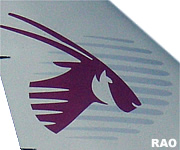 |
In
the late 1970's sports associations were formed to coincide with the Supreme
Council for Youth Welfare and Qatar National Committee in 1979, which
was the real beginning of the sports movement.
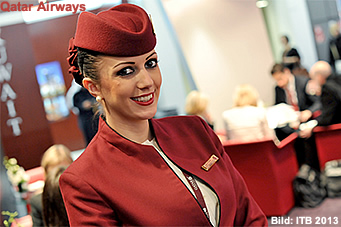 |
|
Qatar has participated in
regional and Arab championships with remarkable attainment. There are now
many sports, cultural and scientific clubs.
The
first, Al Ahli Club, was established in 1950. Among the sports that are
practised in Qatar are baseball, badminton, basketball, cricket, golf,
hockey, rugby, horse racing, diving, camel racing, tennis, judo, squash,
bowling, football, volleyball, & handball. Falconry is a seasonal sport,
practised by the Qatari people and others.
|
|
 |
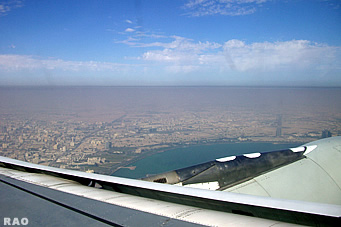 |
| There
are many different kinds of falcons of which the best are: Al-Hurr and
Al-Shaheen which each may be worth up to QR. 25,000 or more. By the way,
the Bowling Club organised eight international championships, the Volleyball
Club six championships and the Squash Club three championships all in 1996.
The Horse Race & Equestrian Club will be organising many championships
including the Qatar Desert Marathon during the year 1997. Moreover, many
championships are going to be organised for Camel Racing, which is one
of the traditional sports in the Gulf area. |
|
| Links |
 |
 |
 |
External
Links |
| QATAR |
 |
|
|
|







